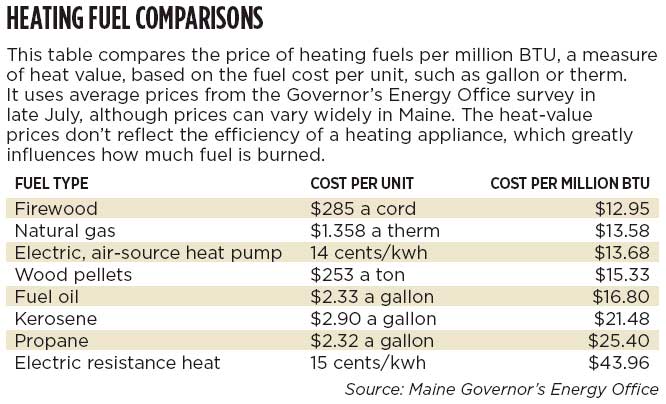Mainers like to take a break from thinking about home heating costs during the summer, but that’s harder to do this year in three suburbs north of Portland.
In neighborhoods of Falmouth, Cumberland and Yarmouth where Summit Natural Gas of Maine is installing gas lines, salespeople in helmets and company T-shirts are riding the streets on Segways, hoping to engage homeowners and convert them to natural gas. A weekly newspaper that serves the three communities features colorful ads run by Summit touting stable gas rates and low air emissions, while guaranteeing that new customers will enjoy prices at least 15 percent lower than oil for a year.
Meanwhile, a lobbying group largely made up of oil and propane dealers has launched its own ad campaign, highlighting falling oil prices and warning that natural gas prices appear to be on their way up.
Summit plans to have gas lines in front of 3,544 homes and businesses in the three towns by the end of the year. More than 40 percent of those owners, a total of 1,417, are expected to convert to gas, the company estimates.
This conversion rate has turned the three towns into a battleground for oil dealers.
Oil has been losing market share statewide to alternative heat sources, such as electric air-source heat pumps, which have emerged as a low-cost option for many Mainers and have prompted some oil dealers to sell and install them. But natural gas, the dominant heating fuel in America, remains an appealing choice. That’s why the fight for hearts and wallets in the northern suburbs is instructive elsewhere in Maine’s built-up areas, where oil rules but hundreds of miles of new natural gas lines are being placed in the ground.
Colorado-based Summit came to Maine in 2012. It has pledged to spend $350 million to connect 15,000 homes in the Kennebec Valley to natural gas, and $73 million to serve 80 percent of the homes in Cumberland, Falmouth and Yarmouth within five years.
Summit stumbled at first, trying to hook up too many people with too few resources. That resulted in safety violations when drilling came too close to sewer lines, and fines at the Maine Public Utilities Commission. But under new leadership, the company has regrouped and appears to be in a better position to meet its goals this season.
It may be full summer, but time is slipping away in the three towns to sign up for gas and have a heating system ready before temperatures cool. Deciding whether to go with gas is especially confusing this year, and the conflicting advertising doesn’t help.
“It’s a tough one right now, with the drop in oil prices,” said Lisa Smith, a senior planner at the Governor’s Energy Office.
GAS, OIL COMPANIES FIGHT IT OUT
Crude oil prices are very volatile, but recently have been on a slide attributed to lower demand and a worldwide oversupply. That led to very low heating oil prices last winter, a trend predicted to continue this winter.
The latest survey done by Smith’s office in mid-July found a statewide average of $2.33 a gallon. Translated into heating unit values, that puts oil at $16.80 per million BTU. Natural gas, averaged among the state’s four local distribution companies, was a bit cheaper, roughly $1.35 a therm, or the equivalent of $13.58 per million BTU, Smith calculated.
That calculation is lacking, however, especially in Falmouth, Cumberland and Yarmouth.
In southern Maine, where there’s more competition, the average price for heating oil was $1.90 a gallon. Summit’s current rate, factoring in a monthly meter charge, is $1.56 per therm, according to Smith. Redoing the heating unit comparison with those figures would flip the advantage to oil, which would cost $13.70 per million BTU compared with $15.60 for gas.
Yet even this calculation falls short. These prices are a summer snapshot. It’s common for oil prices to rise during the heating season. Summit’s rates also are likely headed up, when it files for what’s known as a cost-of-gas adjustment in October at the PUC. And none of these figures accounts for the efficiency of the heating unit, which can make a big difference in consumption.
Against this backdrop, the Maine Energy Marketers Association has taken out ads in the same weekly newspaper as Summit to underscore oil’s price trends, and predictions that it will stay low. The ads also refer to rate hike requests at the PUC from Summit and Maine Natural Gas, which along with Summit is expanding in Augusta and Waterville.
The oil and propane lobbying group has hired the Blaze ad firm in Portland to develop a marketing strategy and has spent $20,000 so far, said Jamie Py, the group’s president. It also is running radio ads in the Augusta area.
“We just want to make sure people understand what they’re getting into,” Py said. “Summit’s out there with more money than God, saying all kinds of things to people. We thought we’d respond as truthfully as we could.”
Summit’s sales pitch hasn’t been persuasive to Joy and Jack Piscopo of Cumberland.
They moved last year into a large condominium in the Rockwood complex off Route 1 and knew that natural gas lines were coming. They went to an informational session held by Summit, but weren’t comforted by what they heard. They left with concerns about lawn repair after the lines were buried, unspecified conversion costs and questions about whether natural gas prices would remain low.
“It seems like a shell game,” Joy Piscopo said.
PRICING TRENDS, CLIMATE EFFECTS
The couple burned 910 gallons and spent $2,242 on oil last winter. In the end, they concluded the payback to replace or convert their 7-year-old oil boiler wouldn’t be worthwhile.
But money was only part of the equation for Shawn Brannigan, general manager of the Allen, Sterling & Lothrop garden center in Falmouth. He says he switched the business to gas last spring because the fuel comes mostly from North America and burns more cleanly than oil.
“Those are my two biggest reasons,” he said. “If we pay the same amount or save money, that’s fine.”
The garden center switched over last March, so Brannigan will have to wait until next year to compare costs. He burned 950 gallons of oil last year at a cost of $2,324 to heat the 6,000-square-foot retail building. He also went through 880 gallons of propane to warm a glass greenhouse, at a cost of $3,259. He’s bound to save money there. On a BTU basis, propane is more expensive than either heating oil or natural gas.
Summit is attempting to grab propane customers with a $375 coupon for the first 500 conversions. The deal complements its 15 percent price guarantee with oil conversions, rebated up to $750, for the first 1,000 customers who sign up by Sept. 1.
“That’s new this year,” said Julie Rowey, a Summit spokeswoman. “It’s something we wanted to test. Last winter, fuel oil was so low, so we wanted to put our money where our mouth is.”
Summit’s newspaper advertising campaign is labeled “The Truth About Natural Gas.” Graphics show that natural gas prices have been largely stable over the past five years, while oil and propane have fluctuated and been higher. Alluding to climate change impact, another ad says gas heat is cleaner than oil, with 30 percent fewer carbon dioxide emissions.
Summit also is working with TideSmart Global, an experiential marketing firm in Falmouth, on the Segway approach. The eight-week campaign will send “brand ambassadors” representing Natural Gas Conversion Co., the Summit subsidiary set up to switch people to gas, into the community.
It’s hard to say how the campaigns are influencing decisions to switch or stay.
“We are about midway through our 2015 sales season and are actively engaging customers in conversations about switching to natural gas in just about every neighborhood in these towns, every day,” Rowey said.
Py, head of the oil and propane lobbying group, plans to touch base soon with his members, to learn what they’re hearing.
“All I want is for customers to stop, look and listen,” he said.
Send questions/comments to the editors.





